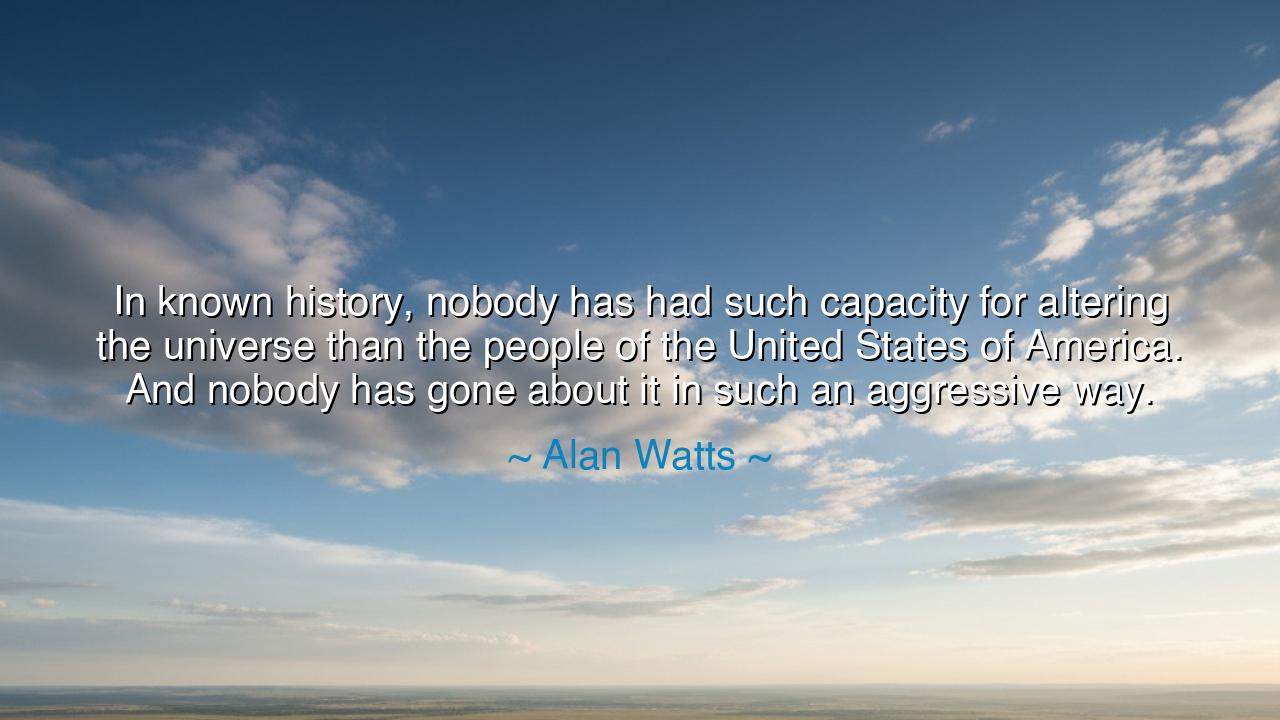
In known history, nobody has had such capacity for altering the
In known history, nobody has had such capacity for altering the universe than the people of the United States of America. And nobody has gone about it in such an aggressive way.






The philosopher Alan Watts, ever the bridge between East and West, once declared: “In known history, nobody has had such capacity for altering the universe than the people of the United States of America. And nobody has gone about it in such an aggressive way.” His words are both a hymn and a warning — a recognition of unmatched power, and an invocation of responsibility. In them lives the paradox of modern civilization: that humanity, in mastering the forces of nature, must also master itself. For to alter the universe is no small thing; it is to stand at the edge of creation, holding the fire of the gods, uncertain whether to build or to burn.
Watts spoke at a time when the American spirit had already reshaped the world. From the birth of the industrial age to the conquest of the stars, the United States had become a furnace of innovation. Electricity, flight, the internet, the atom itself — all were harnessed beneath its hand. Never before had a people wielded so vast a capacity to alter the fabric of existence, both material and moral. Yet Watts, a man of deep contemplation, saw not only the triumph but the danger: that power without reflection becomes aggression, that creation without wisdom leads to destruction. He saw that the same energy that sends rockets to the moon also fuels bombs that darken the earth.
In ancient days, the poets told of Prometheus, who stole fire from the gods and gave it to humankind. With that fire came both knowledge and suffering. For every act of creation carries a shadow, and every leap forward demands a reckoning. So too with America, the modern Prometheus of nations — bold, visionary, restless. From its soil have risen both miracles of science and wounds of war, both declarations of freedom and acts of domination. Watts’ words are thus not condemnation, but revelation: that the more power a people possess, the more deeply they must learn the art of humility.
Consider the story of Oppenheimer, father of the atomic bomb. When the first explosion lit the desert sky of New Mexico, he whispered the words of the Bhagavad Gita: “Now I am become Death, the destroyer of worlds.” That moment was the birth of a new age — the technological apocalypse, the realization that humanity had gained the power to unmake itself. And yet, within that terror also lay the seed of awakening. For never before had humankind been so vividly reminded that the universe we alter is the same universe that sustains us. Power had reached its peak; wisdom was now demanded to match it.
Esmail’s America, in Watts’ eyes, was not merely a country — it was a force of consciousness, a symbol of human potential and peril. Its inventions connected continents, its music crossed oceans, its culture reshaped the dreams of countless souls. But the philosopher’s tone carried both awe and sorrow: for the aggressiveness of this transformation — the ceaseless drive to dominate nature, to bend every element to human will — risked severing humanity from its sacred harmony with the world. The ancients taught that to wound the earth is to wound oneself; yet the modern age often forgets this truth amid its hunger for progress.
And so, this quote becomes not a political statement, but a moral mirror. It calls upon all who inherit this power — not only Americans, but all citizens of the modern world — to awaken to responsibility. To alter the universe must no longer mean conquest, but communion. It must mean shaping with care, building with reverence, creating not from fear but from love. The tools of transformation have been given; now the heart must learn to wield them.
Let the lesson be clear, my children of the electric dawn: greatness lies not in how fiercely one can change the world, but in how wisely one can guide that change. The sword of innovation cuts both ways — it can carve a path to enlightenment or to ruin. Therefore, seek stillness in the storm. Before building, ask: “Does this creation serve life, or my vanity?” Before acting, ask: “Does this bring harmony, or more chaos?” For as Watts himself taught, we do not come into this world — we grow out of it, as leaves from a tree. To alter the universe, then, is to alter ourselves. So act not as conquerors of creation, but as its caretakers. Only then shall the fire we hold illuminate rather than consume.






AAdministratorAdministrator
Welcome, honored guests. Please leave a comment, we will respond soon